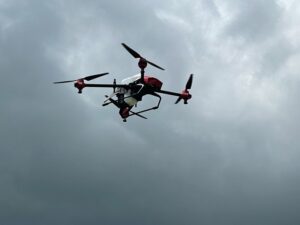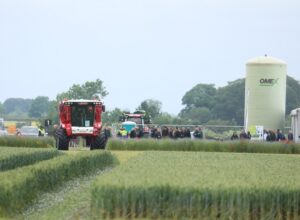Efficiency and sustainability were key themes at this year’s Midlands Machinery Show, with farmers focusing on both within their businesses to ensure a profitable future.
“We’re finding that people are looking for efficient, economic kit that’s good value for money and not expensive to run,” said Hannah Setchfield, director at RC Setchfield, which recently took on the franchises for Merlo telehandlers and Deutz Fahr tractors. “They’re looking for one machine that does multiple jobs; what’s essential rather than what’s luxury.”
Telehandlers can do a wide range of farm work, and farmers are increasingly looking for good quality second-hand equipment, although second hand prices have gone up as demand has risen, she said. Bigger estates with electrical infrastructure and net zero targets are increasingly looking at electrical vehicles, although most farmers are still on the fence when it comes to buying. “The interest is there, but they want to know if it really has the power and capacity to do the work. There’s also uncertainty about charging infrastructure, battery life and second-hand value.”
At the smaller end of the scale is the Kioti tractor. “People are questioning whether they really need a 200hp tractor – the Kioti is very popular for equestrian, golf, grass cutting and muck scraping uses.”
When it comes to capital investments, there is currently more demand for on-farm infrastructure than new machinery, according to John Bellamy, director at Business Finance Brokers. “If people need to buy machinery then they will, but it’s a bit more out of necessity at the moment,” he noted. However, investment in farm improvements or diversification is ongoing. “Diversification and adding value have been the biggest things in farming in the past 10 years.”
The high interest rates are leading people to spread finance over a slightly longer term, and commodity price volatility is encouraging more to opt for monthly, rather than annual payments, he added. “It’s easier to manage cash flow and it give them the flexibility to sell commodities when they want to.”
Efficiencies are also important when it comes to reducing emissions and improving the environment – something which the government’s environmental land management schemes (ELMs) are seeking to encourage. At the NFU conference, which took place alongside the Midlands Machinery Show, Claire Robinson, NFU countryside adviser, explored the incoming options for the Sustainable Farming Incentive (SFI) and Countryside Stewardship scheme.
“We’re expecting the SFI to cover precision farming and no-till in 2024, alongside more cover crops and agroforestry. It’s about making more effective use of your inputs.” New technology like camera-guided precision sprayers could also potentially fall under government grant schemes. “Defra sees ELMs as a way of creating resilience.”
John Deere expects to introduce its See and Spray camera technology to the UK soon, which will help farmers to reduce chemical use by only applying where it is needed, said Dennis Schrijver, precision specialist at John Deere. “We’re in a position to provide technologies that make farming more sustainable and profitable.”
Providing connectivity across the fleet means there is a seamless transition from variable rate mapping in the office to implementing it in the field and monitoring its success in the crop, he added. Farmers can use the Harvest Lab 3000 sensor for real-time analysis of forage and grain quality during harvest; slurry and manure analysis while spreading; and feed ration analysis on the farm. “This means you can optimise nutrient use and maximise crop quality.”
Maximising nutrient use efficiencies reduces damaging leaching – protecting the environment while also benefiting the bottom line, said Dennis. “You can make better choices for your following crop.”
However, in a straw poll of delegates at the NFU conference, only about half use yield mapping on their combine, and even fewer use it to inform decision making. “We’ve had the ability to capture this data for 10 years,” said Tom Bradshaw, deputy president at the NFU. “It’s the next step of using that data which will make the difference.”
And there were plenty of options for visitors to the show to get up close to a wide range of farm machinery that could help them to use this data and improve efficiencies. “We had over 230 exhibitors and 20 live demonstrations,” said show organiser Elizabeth Halsall. “Whether visitors were looking for the latest cutting-edge robotic, electric or precision technology, or a general-purpose tractor to suit a range of mixed farm uses, the kit was on-site to look at, alongside expert advice on how best to use it.”
- The 2024 Midlands Machinery Show will take place on 20-21 November. For more information visit www.midlandsmachineryshow.com.






